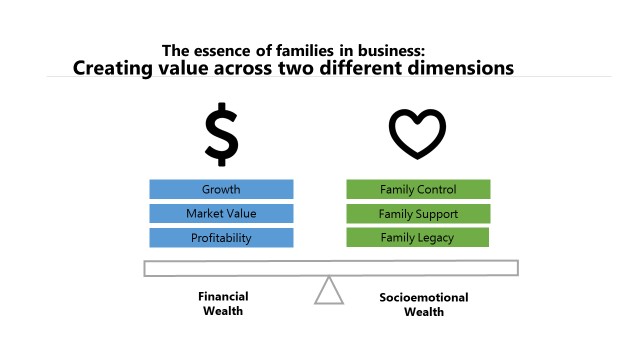“Purpose” has become a key leadership and governance asset, vital for long-term business sustainability, particularly in today’s world of uncertainty, complexity, and multiple disruptions. Companies and their leaders are called upon to act responsibly – with purpose – not only for the sake of their customers and stakeholders but for society at large.
This mindset has taken decades to permeate with Boards, but we are finally at a turning point. The challenge has switched from convincing boards of the need for responsible action to helping them understand how to make their newfound intention actionable.
This is important because while there are a few ways in which a family business or family conglomerate differs from a non-family one, purpose (specifically de facto purpose) stands out as a particular difference, along with the owner’s relations and ownership transfer. Families in business always have an element of legacy in both action and decision making, and the power of inherent purpose is fundamental to a family in business – not only to the performance of that company but to its very survival, and this survival aspect is the main driver of actions taken by the company.
The power of family purpose: there is a lot of truth in it
Cristina Cruz, the Academic Director of the IE Center for Families in Business, is part of an international research team that has conducted several studies on what makes families in business unique. The body of research reveals a different set of goals guiding strategic decision making between family and non-family firms. Family owners tend to uphold non-economic factors such us preserving bloodline succession, family cohesion, emotional connection and legacy.
The research team coined the term “socioemotional wealth” (SEW) to describe the perceived value of such non-economic factors to family owners. They also developed a theoretical framing to explain the “irrational behavior of family firms”: while for non-family firms any decision against firm growth may be seen as irrational, it makes perfect sense for family owners that aim at preserving the family SEW.
Since the publication of the first article about SEW and family firms in 2007, the SEW has become the dominant paradigm in family firm research. What is more important, the approach supports what can be observed in reality: when it comes to family owners, money is not all.
Families in business tend to effectively nurture and grow the intangible assets of their business: identity and culture, values, reputation, trust, brands, relationships, networks, etc. This is because these assets are not simply considered resources of business or wealth; they are part of the family identity.
As a result, family businesses tend to generate more trust amongst stakeholders. Edelman Trust Barometer 2020 found that family businesses are more trusted (67%) than privately-owned companies (60%), public companies (58%), or state-owned companies (52%). Interestingly, the family as a shareholders community reflects a broader range of stakeholder groups, particularly as the family business matures, due to a diversity of personalities, mindsets, and roles of the family members.
“…on average, family-owned companies tend to have a slightly better ESG score than the universe of non-family-owned companies. () Our analysis suggests that older family-owned companies tend, on average, to have a somewhat higher ESG score. () Some investors might also be surprised to see that older family-owned firms have better ESG scores than younger ones given that the ESG agenda is often associated more with younger rather than older people. Older family-owned companies not only have more established business models than younger ones, but will also have a greater number of younger family-owned members associated with the firm. Their interests may lie more with the development of the non-financial corporate agenda rather than the business itself, which could explain the better ESG credentials of older family-owned firms in our view.” Crédit Suisse, The Family 1000: Post the pandemic, September 2020
Families in business seem predestinated to lead by purpose, but they also face transcendental challenges to do so.
From powerful advantage comes powerful opportunity
The impact and handling of purpose in a family in business is dramatically different depending on the DNA and history of the family, which is specific to each case, and also the generic, development stage of the family system, which evolves as the family and its business matures and becomes more complex.
As a family in business develops over time, so must its purpose. For instance, in the first generation, the personal purpose of the founder is extremely powerful and relevant. There are several commonly known examples of this situation: Apple, Amazon, Tesla, Inditex, IKEA, and there is usually a very strong identity of ownership and management of the day-by-day business. The founder’s purpose naturally leads every aspect of the business and the founder is directly involved in decision making. Formalizing the purpose of the company is not mission critical at this stage because the founder embodies his or her values and is likely to continuously and consistently state the purpose of the company in various manners.
Here the purpose is a true superpower for the family business because it drives the construction of the company since its founding; while later on the process tends to be the other way around (building a purpose from de facto premises.)
From our experience working with complex families in business we have learned that in following generations, the fact of being a family in business takes on a more challenging aspect to the purpose, which, along the way, must evolve from a singular individual’s vision to a shared purpose.
Family members are indeed predisposed to understand the relevance of the intangible, socio-emotional assets of the family business, because they spend a lifetime internalizing those values and purpose. Nevertheless, a family that is successful in business for the long term must continually discuss and agree on their collective purpose, vision, and guiding principles in order to ensure cohesion. In this process, it is important that individual expectations and roles are aligned with a shared vision for the business and there is a common understanding of the family itself, the business, and the created wealth.
Within the maturation phase, moving from a sibling partnership towards a family dynasty is nothing less than a challenge. The need for alignment between personal expectations and a shared (if it can indeed reach that shared point) purpose is crucial. When done well, a shared purpose – and all its implications – becomes a key asset to holding both the family and the business together. If not, there is potential for conflict, which is in its own manner, equally powerful in that it can undermine shareholder agreement as well as the family system as a whole, on both a business and a private level. Misunderstandings in regards to familial trust, love, and respect can lead to a lack of open communication and a lack of formalization in company aspects such as roles, company structure, governance, and more.
However, it is not sufficient to simply achieve consensus among family members. The whole ‘system’ must be coherent, between purpose/vision and execution, and this is what can be defined as vertical coherence. Likewise, there must be coherence among the three areas of the family itself, the business, and the wealth, and this is what we identify as horizontal coherence. The family, the business, and the wealth are interrelated and interdependent in several ways (for example, resource assignment and impact), and must therefore be planned and governed as part of the whole picture.
The level and nature of involvement of the family as a group in the business can also change over the long-term, specifically decades and generations. As the family moves from a management role within the business structure to a governance role, or even stepping into a pure investor role, the transition requires a fundamental review of the shared purpose as a family business unit. This is important in order to ensure consensus amongst family members on the new role and on the reasons behind the purpose of continuing to function as a cohesive business unit within the company. The effort requires a clear formalization and governance of the purpose in order for it to be actionable by professional managers who are outside of the family unit.
Finally, a strong family purpose should be a guide for growth ambition, risk appetite, and dividends and liquidity expectations, as well as principles for diversification and philanthropic activities. But as such, it can also become a deadly inhibitor of innovation, diversification, and divestments, with the argument of sticking to tradition for emotional and cohesion reasons. Evolving the family purpose (and thus the business as a whole) is a far riskier and more difficult process than reviewing the purpose of a non-family corporation, because a positive outcome is anything but assured.
The journey towards a shared purpose, which drives strategy and execution and which continually evolves, is unique for each family in business and the process should be planned as carefully as possible and according to the specific characteristics of the family (maturity, values, and personalities, for example.) The challenges are complex, but purpose has the potential to become a superpower and competitive advantage for a family in business and serve as its backbone for transgenerational value creation.
© IE Insights.






